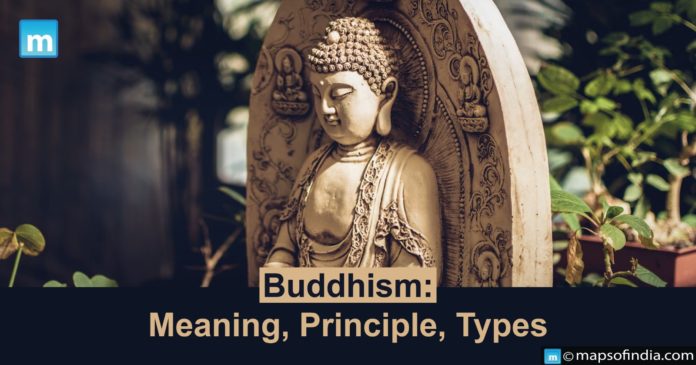What is Buddhism?
Buddhism is a prominent international religion that emerged roughly 2,500 years ago in ancient India. It is centred on Siddhartha Gautama’s doctrines, who became renowned as the Buddha, meaning “awakened one.” According to Buddhism, the ultimate purpose of life is to reach awakening or enlightenment, which is a condition of ultimate serenity and escape from suffering. Buddhism also teaches the concept of karma, which is the idea that a person’s actions and intentions create a cumulative effect that determines their future lives.
Principles of Buddhism
Buddhism is a spiritual and intellectual philosophy founded on the lessons imparted by the Buddha, Siddhartha Gautama. The Noble Eightfold Path and The Four Noble Truths summarise Buddhist concepts.
The Four Noble Truths are as follows:
- The truth of suffering: All living beings experience suffering, pain, and unsatisfactoriness.
- The truth of the cause of suffering: Suffering arises from craving and attachment, which stem from ignorance.
- The truth about misery elimination: There is a technique to abolish suffering by removing desire and attraction.
- According to Buddhist doctrine, the Noble Eightfold Way is the true road that leads to the end of suffering.
Buddhism also emphasizes the practice of mindfulness, which involves being fully present and aware of one’s thoughts, feelings, and surroundings. This practice can help individuals understand their minds and develop compassion and understanding for others.
In addition, Buddhism teaches the concept of karma, the idea that our actions have outcomes in our life and future lives. This understanding of karma emphasizes the importance of ethical behaviour and cultivating positive qualities such as generosity, kindness, and wisdom.
Types of Buddhism followed around the world
Buddhism is a major world religion with diverse traditions and practices. Here are some of the main types of Buddhism followed around the world:
-
Theravada Buddhism
Also known as the “Doctrine of the Elders,” Theravada is the oldest surviving school of Buddhism. It is prevalent in Sri Lanka, Thailand, Myanmar, and Southeast Asia. Theravada Buddhism focuses on the Buddha’s original teachings and the attainment of individual enlightenment through meditation and mindfulness.
-
Mahayana Buddhism
Mahayana is a more liberal and inclusive form of Buddhism, focusing on compassion and the Bodhisattva ideal of helping others achieve enlightenment. It is prevalent in China, Japan, Korea, and other parts of East Asia. Mahayana Buddhism includes sub-schools such as Zen, Pure Land, and Nichiren.
- Vajrayana Buddhism
Also known as Tibetan Buddhism, Vajrayana is a form of Buddhism that originated in Tibet and the Himalayan region. It emphasizes the use of tantric practices and esoteric rituals to achieve enlightenment. Vajrayana Buddhism includes sub-schools such as Nyingma, Kagyu, Sakya, and Gelug.
-
Zen Buddhism
Zen is a form of Mahayana Buddhism that originated in China and later spread to Japan and other parts of the world. It emphasizes the practice of meditation and mindfulness to achieve enlightenment. Zen Buddhism is known for its emphasis on direct experience and for using paradoxical language and koans (riddles) to stimulate insight.




